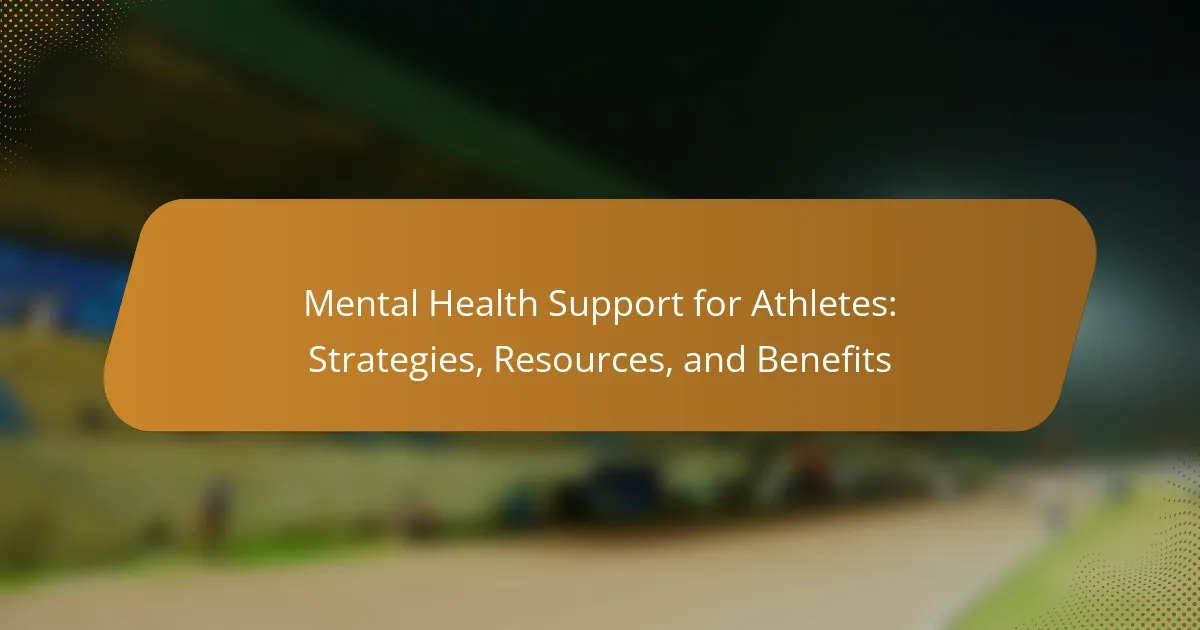Mental health support is essential for athletes facing challenges like anxiety, depression, and burnout. This article explores effective strategies, including mindfulness practices and professional counseling. It highlights valuable resources, such as athlete assistance programs and peer networks. The benefits of prioritizing mental health include improved performance, resilience, and overall well-being.
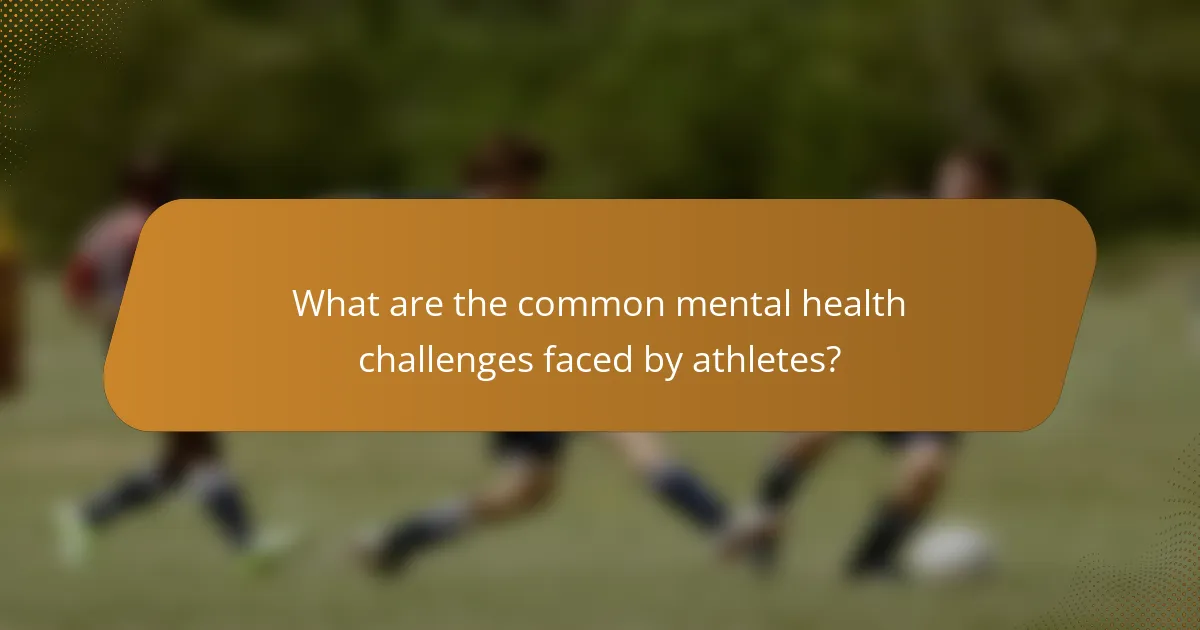
What are the common mental health challenges faced by athletes?
Athletes commonly face mental health challenges such as anxiety, depression, and burnout. These issues arise from intense competition, pressure to perform, and the physical demands of their sport.
Anxiety manifests as excessive worry about performance or injury, impacting focus and confidence. Depression can result from prolonged stress or injury, leading to feelings of isolation and hopelessness. Burnout occurs when athletes feel exhausted and disengaged, often due to relentless training schedules and competition pressures.
Addressing these challenges is crucial for athletes’ overall well-being. Strategies include mental health education, access to counseling services, and promoting a supportive environment. Resources like athlete assistance programs and peer support networks can provide essential help.
The benefits of mental health support are significant. Improved mental resilience enhances performance, reduces dropout rates, and fosters a healthier relationship with sports. Prioritizing mental health leads to holistic athlete development, ensuring both physical and psychological well-being.
How do performance pressures impact mental well-being?
Performance pressures can significantly harm mental well-being by increasing anxiety and stress levels. Athletes often face high expectations, leading to burnout and decreased motivation. Mental health support strategies, such as mindfulness training and access to counseling resources, can mitigate these effects. Regular mental health check-ins and open communication within teams foster a supportive environment, enhancing overall performance and well-being.
What role does injury play in mental health struggles?
Injury significantly impacts mental health struggles for athletes, often leading to anxiety and depression. The psychological effects of injury can stem from loss of identity, decreased self-esteem, and fear of reinjury. Athletes may experience isolation due to the inability to participate in their sport, which can exacerbate feelings of loneliness. Access to mental health support is crucial in helping athletes navigate these challenges, providing coping strategies and fostering resilience. Engaging in mental health resources can facilitate recovery and improve overall well-being, highlighting the importance of addressing psychological aspects alongside physical rehabilitation.
How does the stigma around mental health affect athletes?
The stigma around mental health negatively impacts athletes by discouraging them from seeking support. This stigma can lead to feelings of isolation and exacerbate mental health issues. Athletes may fear judgment from peers and coaches, which hinders open discussions about mental well-being. As a result, many athletes suffer in silence, affecting their performance and overall health. Promoting a culture of acceptance and providing accessible mental health resources can help mitigate these effects.
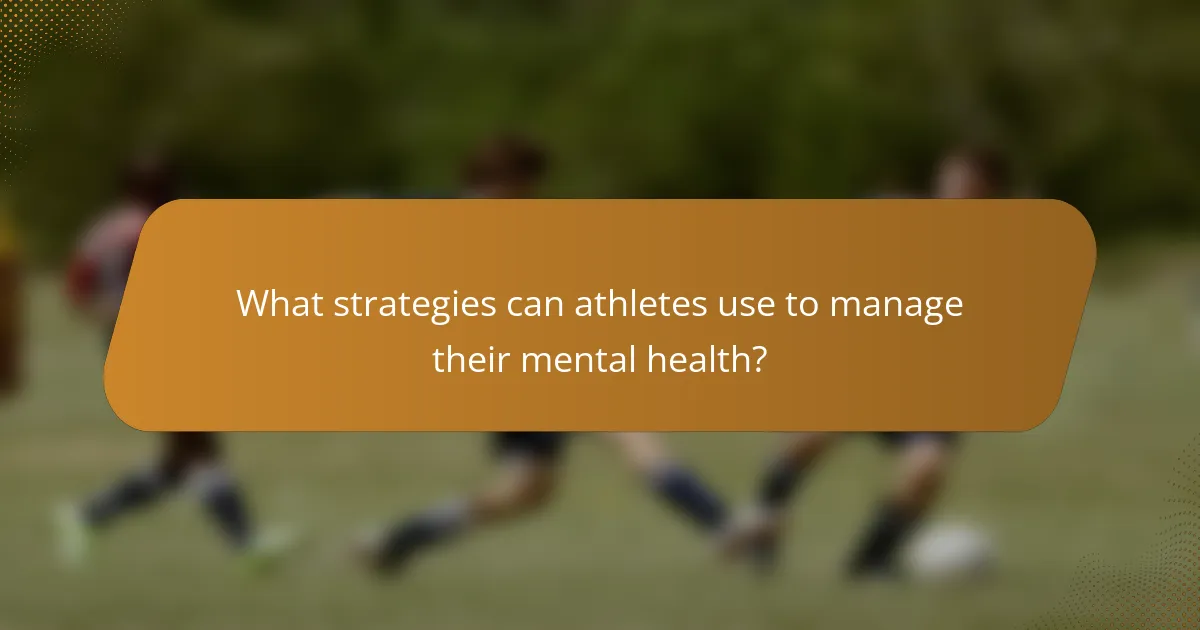
What strategies can athletes use to manage their mental health?
Athletes can manage their mental health through strategies such as mindfulness practices, seeking professional support, and establishing strong social connections. Mindfulness techniques, like meditation, help reduce anxiety and improve focus. Professional support from therapists or sports psychologists provides tailored coping strategies. Building social connections with teammates fosters a supportive environment, enhancing emotional resilience. Regular physical activity also promotes mental well-being, as exercise releases endorphins that improve mood. Prioritizing rest and recovery is essential for mental clarity and overall performance.
Which coping mechanisms are most effective for athletes?
Coping mechanisms effective for athletes include mindfulness, cognitive-behavioral techniques, and social support. Mindfulness practices enhance focus and reduce anxiety. Cognitive-behavioral methods help reframe negative thoughts. Social support fosters emotional resilience. Each strategy contributes uniquely to mental health.
How can mindfulness and meditation benefit athletes?
Mindfulness and meditation significantly enhance athletes’ mental health by reducing stress and improving focus. These practices foster resilience, enabling athletes to handle competitive pressure more effectively. Studies show that regular mindfulness practice can lead to improved performance and greater emotional regulation. Additionally, these techniques promote a sense of well-being, which is crucial for maintaining motivation and preventing burnout.
What role does physical training play in mental health support?
Physical training significantly enhances mental health support for athletes by reducing anxiety and improving mood. Engaging in regular physical activity releases endorphins, which are natural mood lifters. Additionally, structured training routines provide a sense of discipline and accomplishment, fostering self-esteem. Research indicates that athletes who incorporate physical training into their mental health strategies experience lower levels of stress and improved overall well-being. This holistic approach to mental health emphasizes the interconnectedness of physical and psychological fitness.
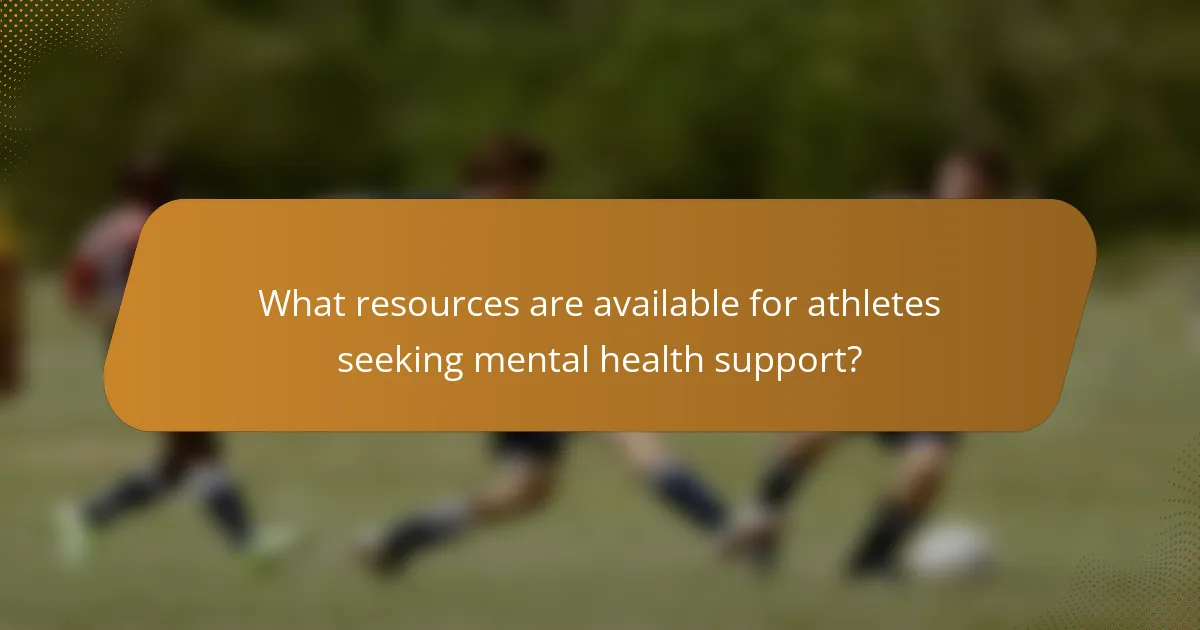
What resources are available for athletes seeking mental health support?
Athletes can access various mental health support resources, including counseling services, hotlines, and workshops. These resources help address stress, anxiety, and performance pressure. Professional organizations often provide tailored programs, while community support networks offer peer assistance. Additionally, online platforms facilitate access to mental health professionals specializing in sports psychology.
Which organizations provide specialized mental health services for athletes?
Organizations providing specialized mental health services for athletes include the National Athletic Trainers’ Association, the American Psychological Association, and the Professional Players’ Federation. These entities offer tailored programs focusing on the psychological well-being of athletes.
1. National Athletic Trainers’ Association – Provides resources and education on mental health in sports.
2. American Psychological Association – Offers guidelines for psychologists working with athletes.
3. Professional Players’ Federation – Supports athletes’ mental health through advocacy and resources.
4. The International Olympic Committee – Develops mental health initiatives for Olympic athletes.
5. Athletes for Hope – Connects athletes with mental health resources and support networks.
6. Mental Health America – Provides advocacy and resources for athletes facing mental health challenges.
How can coaches and trainers support athletes’ mental health?
Coaches and trainers can support athletes’ mental health through targeted strategies and resources. They should prioritize open communication, create a supportive environment, and provide access to mental health professionals. Regular check-ins can help identify stressors and offer timely interventions. Training programs should include mental resilience techniques to enhance coping skills. Additionally, promoting a balanced lifestyle through proper nutrition and rest contributes to overall mental well-being. These approaches not only improve athletes’ performance but also foster long-term mental health benefits.
What online platforms offer mental health resources for athletes?
Several online platforms provide mental health resources specifically for athletes. These include Headspace, which offers guided meditations tailored for performance, and the Athlete Mental Health app, designed to connect athletes with mental health professionals. Additionally, the National Alliance on Mental Illness (NAMI) provides educational resources and support networks for athletes facing mental health challenges. The International Olympic Committee also offers mental health guidelines and resources for athletes at all levels. These platforms aim to enhance mental well-being and provide necessary support.
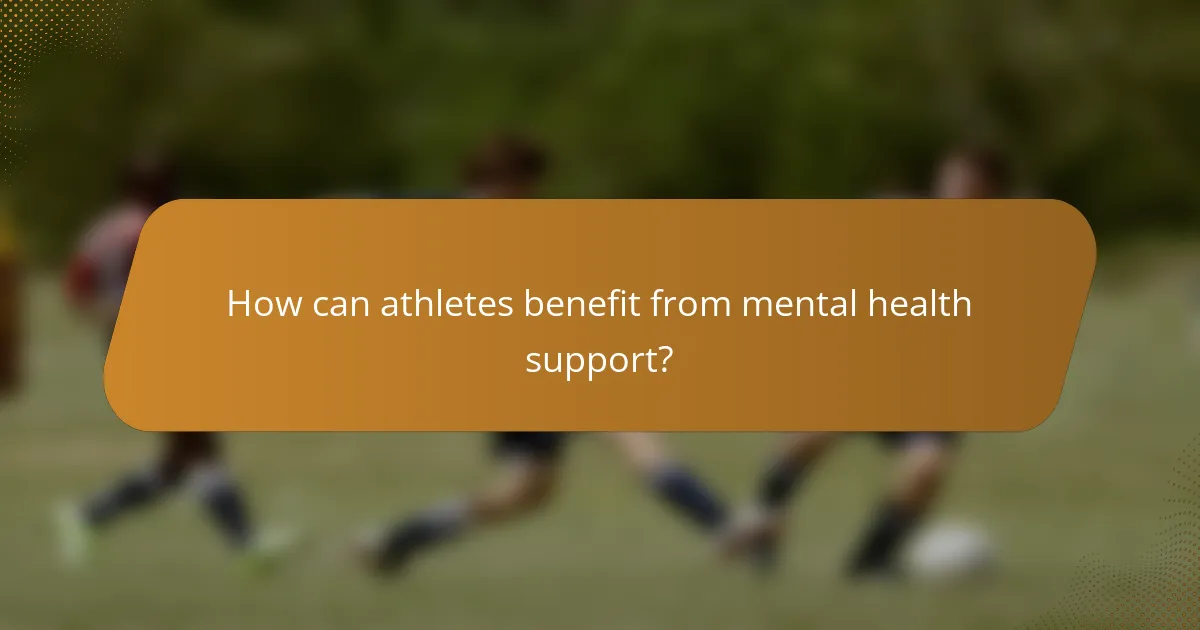
How can athletes benefit from mental health support?
Athletes can significantly benefit from mental health support by improving performance, resilience, and overall well-being. Mental health resources help athletes manage stress, anxiety, and pressure, which can enhance focus and motivation. Strategies such as counseling, mindfulness, and peer support foster emotional regulation and coping skills. Research shows that athletes receiving mental health support experience lower injury rates and quicker recovery times. Access to these resources promotes a healthier, more balanced approach to sport and life.
What are the performance benefits of prioritizing mental health?
Prioritizing mental health enhances athletic performance by improving focus, resilience, and overall well-being. Athletes who engage in mental health support experience reduced stress and anxiety, leading to better training outcomes and competition results. Research shows that mental health interventions can increase motivation and enhance recovery times, contributing to sustained performance improvements. Additionally, athletes with strong mental health support systems demonstrate greater teamwork and communication skills, which are essential for success in competitive environments.
How does mental health support enhance overall life satisfaction for athletes?
Mental health support significantly enhances overall life satisfaction for athletes by providing coping strategies and emotional resilience. This support fosters a positive mindset, reduces stress, and improves performance. Access to mental health resources can lead to better relationships with coaches and teammates, creating a supportive environment. Studies show that athletes receiving mental health support report higher levels of life satisfaction and well-being.
What unique perspectives do elite athletes have on mental health?
Elite athletes view mental health as integral to performance and well-being. They emphasize resilience, self-awareness, and the importance of support systems. Unique perspectives include the need for tailored mental health strategies, recognizing the pressure of public expectations, and the impact of injuries on mental well-being. Many athletes advocate for open discussions about mental health, aiming to reduce stigma and encourage peer support.
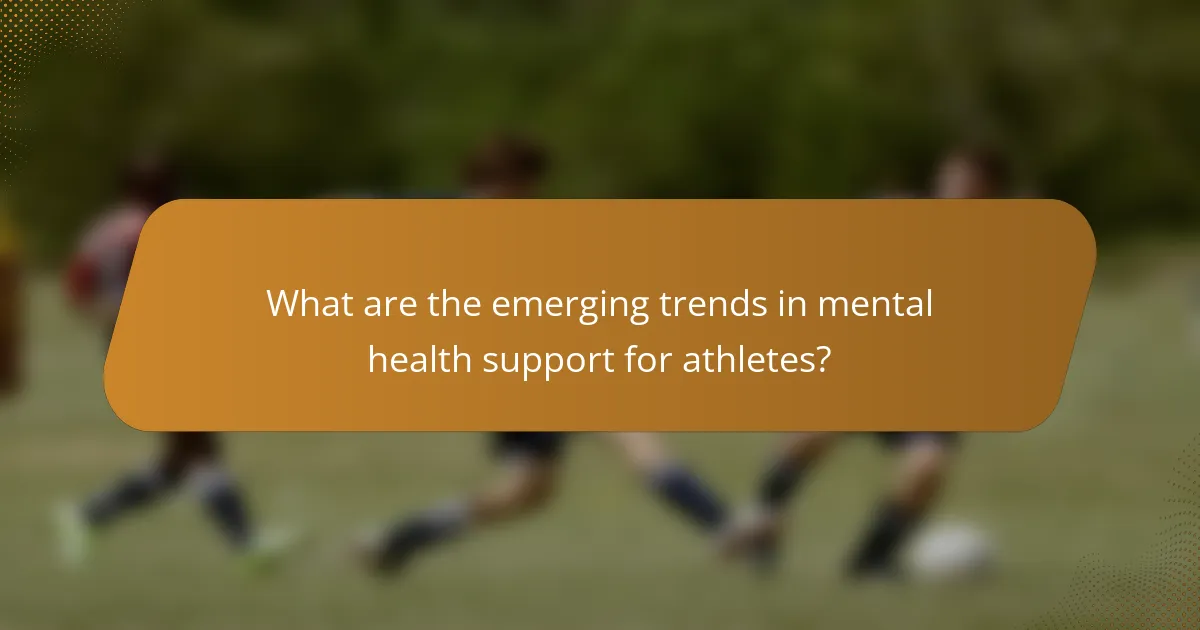
What are the emerging trends in mental health support for athletes?
Emerging trends in mental health support for athletes focus on personalized care, technology integration, and holistic approaches. These strategies enhance emotional resilience and performance.
One significant trend is the use of teletherapy, allowing athletes to access mental health resources remotely. This approach increases accessibility and convenience, accommodating busy schedules.
Another trend involves the integration of mental health professionals within sports teams. This fosters a supportive environment that prioritizes athletes’ mental well-being alongside physical training.
Lastly, there is a growing emphasis on mindfulness and mental conditioning programs. These initiatives help athletes manage stress and improve focus, contributing to overall performance enhancement.
How is technology shaping mental health interventions for athletes?
Technology significantly enhances mental health interventions for athletes by providing tailored support and resources. Wearable devices monitor stress levels and emotional states, enabling real-time feedback. Teletherapy platforms offer convenient access to mental health professionals, fostering timely interventions. Mobile apps facilitate mindfulness and cognitive behavioral techniques, promoting emotional resilience. Data analytics help identify patterns in mental health trends, allowing for proactive measures. As a result, athletes receive comprehensive support that addresses their unique challenges.
What innovative practices are being adopted in sports psychology?
Innovative practices in sports psychology include mindfulness training, cognitive behavioral techniques, and virtual reality simulations. These strategies enhance mental resilience and focus among athletes. For instance, mindfulness improves emotional regulation, leading to better performance under pressure. Additionally, virtual reality allows athletes to practice mental skills in a controlled environment, promoting confidence and reducing anxiety. As a result, these practices contribute significantly to athletes’ overall mental health and performance outcomes.
How does cultural context influence mental health support in sports?
Cultural context significantly influences mental health support for athletes by shaping perceptions and approaches to mental well-being. Different cultures may prioritize emotional expression or stigmatize mental health issues, impacting athletes’ willingness to seek help.
For instance, collectivist cultures often emphasize community and may provide support through family or team networks. In contrast, individualistic cultures might focus on personal responsibility, potentially leading to isolation for those struggling.
Additionally, cultural beliefs can dictate the types of mental health resources available. Some cultures may prefer traditional methods, such as community leaders or spiritual practices, over professional psychological support. This variation highlights the need for culturally competent mental health strategies in sports, ensuring athletes receive appropriate and effective support.
Ultimately, recognizing these cultural nuances can enhance the effectiveness of mental health initiatives, fostering a supportive environment for athletes across diverse backgrounds.
What are the best practices for integrating mental health support into athletic training?
Integrating mental health support into athletic training involves creating a holistic approach that prioritizes athletes’ emotional well-being. Effective strategies include training staff on mental health awareness, providing access to mental health professionals, and fostering an open environment for discussing mental health issues.
Additionally, incorporating mental health resources such as workshops, support groups, and mindfulness training can enhance athletes’ resilience. Regular assessments of athletes’ mental health and creating individualized support plans are also critical. These practices not only improve athletes’ performance but also contribute to their overall well-being and longevity in sports.
